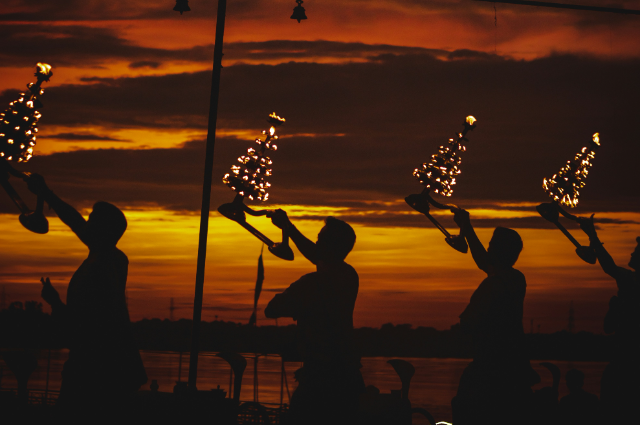
Photo by Sneha Sivarajan on Unsplash
India, known as Punyalbhumi Bharatvarsha, is not just a nation but a sacred civilization woven with spirituality, devotion, and timeless heritage. It is the land where Sanatan Dharma was born, where great sages meditated, and where temples stand as eternal symbols of faith. Every stone, river, and mountain in Bharatvarsha carries a story of divine energy, making it the spiritual heartbeat of the world.
The Spiritual Essence of Bharatvarsha
Bharatvarsha is more than a geographical territory; it is a land where the divine walks alongside the mortal. From the Himalayas to Kanyakumari and from Kashi to Dwarka, every inch of India is sanctified by devotion. The presence of thousands of temples, holy rivers, and pilgrimage sites makes it a land where faith is not just practised but lived.
The concept of tirtha yatra (pilgrimage) in Hinduism, Jainism, Buddhism, and Sikhism emphasizes that travelling to sacred sites is a path to self-purification and enlightenment. Whether it is the Char Dham Yatra, the Jyotirlingas, or the Shakti Peethas, each pilgrimage uplifts the soul, reconnecting devotees to their spiritual roots.
Magnificent Temples and Pilgrimages
1. Kashi Vishwanath – The Eternal City of Lord Shiva
Kashi (Varanasi) is the holiest city in Hinduism, where Lord Shiva himself resides. The Kashi Vishwanath Temple stands as a symbol of divine power, and the Ganga Aarti at Dashashwamedh Ghat is a celestial experience where flames, chants, and devotion create an atmosphere of pure divinity. It is believed that those who breathe their last in Kashi attain Moksha (liberation).
2. Jagannath Puri – The Lord of the Universe
The Jagannath Temple in Puri, Odisha, is not just a temple; it is a living miracle. The annual Rath Yatra, where Lord Jagannath, Balabhadra, and Subhadra ride their grand chariots, attracts millions. The temple’s mysteries—such as its flag always flying against the wind and the absence of birds flying above it—remain unexplained by science, proving its divine essence.
3. Rameshwaram – The Bridge to Divinity
Rameshwaram Temple in Tamil Nadu is where Lord Rama built Ram Setu in Lanka. The temple’s 22 sacred wells, each with unique mineral content, are believed to cleanse sins. It is a pilgrimage that connects devotees directly to the Ramayana.
4. Ayodhya & Mathura – Birthplaces of Divine Avatars
Ayodhya, the birthplace of Lord Rama, is one of the seven holiest cities (Sapta Puri). The newly constructed Ram Mandir stands as a monumental tribute to faith and devotion.
Mathura and Vrindavan, where Lord Krishna was born and spent his childhood, resonate with bhakti (devotion). The temples of Banke Bihari, Prem Mandir, and ISKCON are vibrant with Krishna’s eternal levels.
5. Kedarnath & Badrinath – Mystical Abodes in the Himalayas
Kedarnath, one of the twelve Jyotirlingas, is where Lord Shiva blesses devotees amidst the towering Himalayas. Badrinath, dedicated to Lord Vishnu, is the northernmost Char Dham site, where spirituality meets nature’s magnificence.
The Cultural and Historical Richness of Bharatvarsha
Apart from being a spiritual hub, Bharatvarsha is also a treasure trove of history and culture.
1. Haridwar & Rishikesh – The Divine Flow of the Ganga
Haridwar, one of the Sapta Puris, hosts the Kumbh Mela, where millions take a dip in the Ganga to cleanse their souls.
Rishikesh, known as the Yoga Capital of the World, is where sages meditate to attain enlightenment.
2. Ajanta & Ellora – Carvings of Spiritual Grandeur
These ancient caves in Maharashtra depict Buddhist, Hindu, and Jain philosophies, showcasing India’s artistic brilliance. The Kailasa Temple at Ellora, carved from a single rock, is a marvel of devotion and engineering.
3. The Shakti Peethas – The Power of the Goddess
There are 51 Shakti Peethas across India, each linked to the body parts of Goddess Sati that fell after Lord Shiva’s cosmic dance. Some of the most famous ones include:
- Kamakhya (Assam)** – Where Sati’s womb fell, symbolizing fertility and creation.
- Vaishno Devi (Jammu & Kashmir)** – The divine abode of Maa Vaishnavi.
- Kalighat (Kolkata)** – One of the most revered temples dedicated to Goddess Kali.
Why Bharatvarsha is Called "Punyalbhumi"?
- The Land of Dharma – India is the birthplace of Sanatan Dharma, Buddhism, Jainism, and Sikhism, making it the spiritual nucleus of the world.
- The Land of Great Sages – From Adi Shankaracharya and Swami Vivekananda to Sri Ramakrishna and Paramahansa Yogananda, Bharatvarsha has produced spiritual giants who guided humanity.
- The Land of Pilgrimage – Every year, millions undertake pilgrimages to sacred sites like Vaishno Devi, Kedarnath, Somnath, and Tirupati, proving the everlasting power of devotion.
- The Land of Divine Festivals – Celebrations like Diwali, Holi, Navaratri, and Makar Sankranti are not just cultural festivals but deeply spiritual experiences that unite the nation in devotion.
Through these elements, Bharatvarsha stands as a living testament to the profound spirituality and rich heritage that define its essence.
